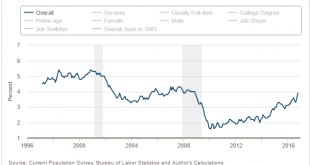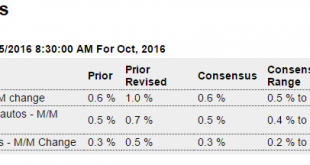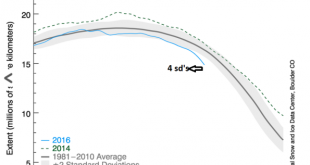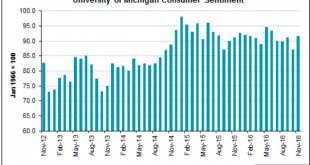So if new hires are at the lowest end of the wage scale, a reduction in the growth of new hires increases the average growth rate? Also note the large ‘dip’ in growth to less than 2% from the last recession. The ‘lost wage growth’ doesn’t even begin to get ‘made up’ until the rate of growth exceeds the prior average of about 4%: Aggregate demand is still being lost as the cutbacks from the collapse of oil capex 2 years ago continue: U.S.-based energy companies announced plans...
Read More »To President Obama and Secretary Clinton: In the name of god, go
Dear Secretary Clinton and President Obama: On April 20, 1653, Oliver Cromwell spoke these words to the Long Parliament: “You have sat here too long for any good you have been doing… Depart, I say, and let us have done with you. In the name of god, go.” Secretary Clinton, you are rightly being blamed for the electoral [...]
Read More »Retail sales, Empire manufacturing, Redbook retail sales, Business inventories
Good report, driven by autos, which were up from last month though down from last year. However, on a year over year basis vehicles sales if anything seem to be moderately declining, and so won’t be contributing to growth as they had in the past. So a glimmer of hope here, but guarded to say the least: Highlights The consumer started the fourth-quarter better than expected and finished the third-quarter even stronger than that. Retail sales jumped 0.8 percent in October...
Read More »Food and Justice
The WEA online conferenceFood and JusticeIdeas for a new global food agenda is now openThe DISCUSSION FORUM is open access.
Read More »Surviving the Age of Trump
from Dean Baker I will claim no special insight into the politics that led to Trump’s election last Tuesday. I was as surprised as anyone else when not just Florida and North Carolina, but also Pennsylvania, Michigan, and Wisconsin started to turn red. But that’s history now. We have to live with the fact of President Trump and we have to figure out how to protect as much as possible of what we value in this country from his presidency. This won’t be easy when the Republicans control both...
Read More »Two little black swans
Most tables of the normal distribution stop at 3 standard distributions or, to state this differently, at the point were (assuming a stable world) the chance that an individual estimate of a variable is farther removed from the average of all estimated variables is 1:1000. Let’s call this the black swan point. Estimates further removed from the average are ‘black swans’. Such estimates might indicate that we’ve moved to a new situation with a new average. Ahem: arctic and antarctic sea...
Read More »Deregulation, austerity and the polarization of labour markets
from Maria Alejandra Madi The huge growth of deregulated finance has been associated to a new financial regime and great transformations in the pattern of economic growth. Looking back, there has been a narrow relationship between the crisis of the post-war accumulation pattern, the evolution of the international monetary system and the process of financial deregulation. In fact, as Bello (2006) warned, in the 1980s, Reaganism and structural adjustment were not successful attempts to...
Read More »Why the Pollsters Totally Failed to Call a Trump Victory, Why I (Sort Of) Succeeded – and Why You Should Listen to Neither of Us
The views expressed in this article are the author’s own and do not reflect the views of his employer. The election of Donald Trump as president of the United States will likely go down in history for any number of reasons. But let us leave this to one side for a moment and survey some of the collateral damage generated by the election. I am thinking of the pollsters. By all accounts these pollsters – specifically the pollster-cum-pundits – failed miserably in this election. Let us...
Read More »James Meade Redux
from Peter Radford Well, that was fun. A rebellion has swept away the establishment. I never thought I would say that the rebellion would be manifested within the GOP and that the establishment would be within the Democrats, but that’s what we just witnessed. We on the left must accept that whatever we were saying just didn’t resonate with enough people. The Democrat’s obsession with identity politics that allowed it to ignore the consequences of its embrace of neoliberal economics has...
Read More »Consumer sentiment, Retail employment
A bit of a Trump boost, but the general downtrend of the last couple of years is still intact: Retail Employment Gains Fall 21% From A Year Ago By Challenger Gray and Christmas Nov 10 (Econintersect) — Despite largescale hiring announcements from numerous major retailers, the number of October employment gains in the sector declined 21 percent from a year ago to 154,600. That was the fewest job gains to kick off the holiday hiring season since 2012. ...
Read More » Heterodox
Heterodox





